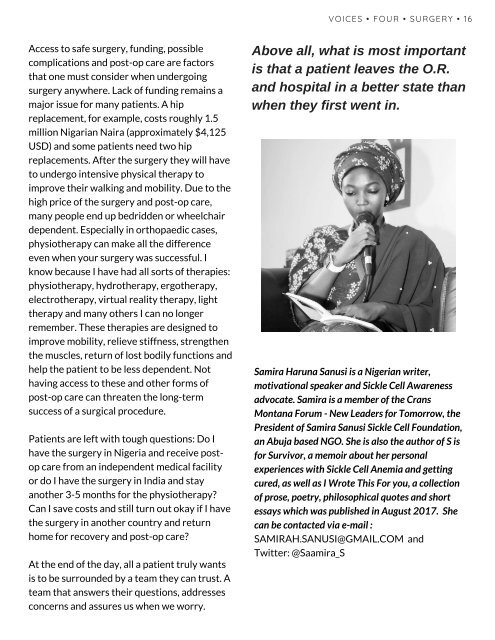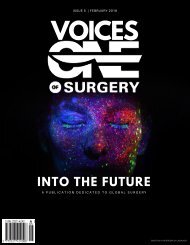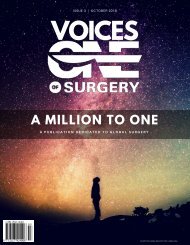Safety First - Voices of One Surgery - Issue 4: December 2018
As we celebrate 10 years of the launch of the World Health Organisation Surgical Safety Checklist and the success it gave, One.Surgery recognises the many challenges that still exist today in the pursuit of providing safe surgery to every patient worldwide.
As we celebrate 10 years of the launch of the World Health Organisation Surgical Safety Checklist and the success it gave, One.Surgery recognises the many challenges that still exist today in the pursuit of providing safe surgery to every patient worldwide.
Create successful ePaper yourself
Turn your PDF publications into a flip-book with our unique Google optimized e-Paper software.
VOICES • FOUR • SURGERY • 16<br />
Access to safe surgery, funding, possible<br />
complications and post-op care are factors<br />
that one must consider when undergoing<br />
surgery anywhere. Lack <strong>of</strong> funding remains a<br />
major issue for many patients. A hip<br />
replacement, for example, costs roughly 1.5<br />
million Nigarian Naira (approximately $4,125<br />
USD) and some patients need two hip<br />
replacements. After the surgery they will have<br />
to undergo intensive physical therapy to<br />
improve their walking and mobility. Due to the<br />
high price <strong>of</strong> the surgery and post-op care,<br />
many people end up bedridden or wheelchair<br />
dependent. Especially in orthopaedic cases,<br />
physiotherapy can make all the difference<br />
even when your surgery was successful. I<br />
know because I have had all sorts <strong>of</strong> therapies:<br />
physiotherapy, hydrotherapy, ergotherapy,<br />
electrotherapy, virtual reality therapy, light<br />
therapy and many others I can no longer<br />
remember. These therapies are designed to<br />
improve mobility, relieve stiffness, strengthen<br />
the muscles, return <strong>of</strong> lost bodily functions and<br />
help the patient to be less dependent. Not<br />
having access to these and other forms <strong>of</strong><br />
post-op care can threaten the long-term<br />
success <strong>of</strong> a surgical procedure.<br />
Patients are left with tough questions: Do I<br />
have the surgery in Nigeria and receive postop<br />
care from an independent medical facility<br />
or do I have the surgery in India and stay<br />
another 3-5 months for the physiotherapy?<br />
Can I save costs and still turn out okay if I have<br />
the surgery in another country and return<br />
home for recovery and post-op care?<br />
At the end <strong>of</strong> the day, all a patient truly wants<br />
is to be surrounded by a team they can trust. A<br />
team that answers their questions, addresses<br />
concerns and assures us when we worry.<br />
Above all, what is most important<br />
is that a patient leaves the O.R.<br />
and hospital in a better state than<br />
when they first went in.<br />
Samira Haruna Sanusi is a Nigerian writer,<br />
motivational speaker and Sickle Cell Awareness<br />
advocate. Samira is a member <strong>of</strong> the Crans<br />
Montana Forum - New Leaders for Tomorrow, the<br />
President <strong>of</strong> Samira Sanusi Sickle Cell Foundation,<br />
an Abuja based NGO. She is also the author <strong>of</strong> S is<br />
for Survivor, a memoir about her personal<br />
experiences with Sickle Cell Anemia and getting<br />
cured, as well as I Wrote This For you, a collection<br />
<strong>of</strong> prose, poetry, philosophical quotes and short<br />
essays which was published in August 2017. She<br />
can be contacted via e-mail :<br />
SAMIRAH.SANUSI@GMAIL.COM and<br />
Twitter: @Saamira_S








